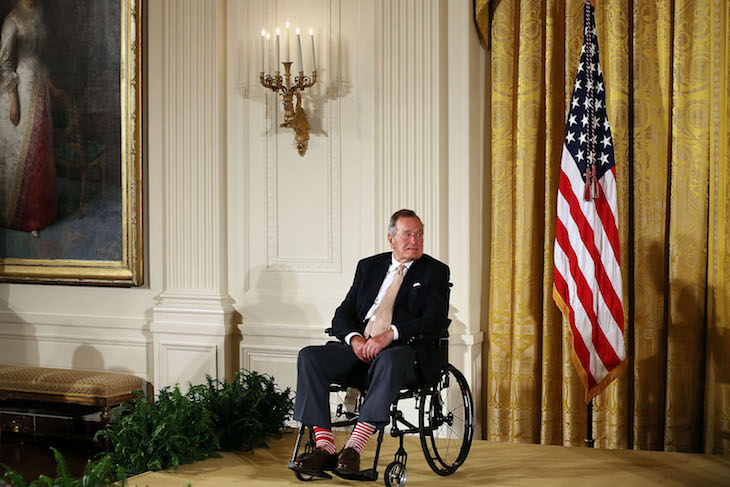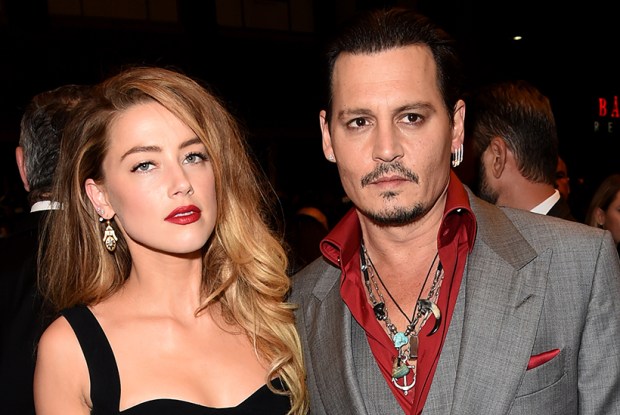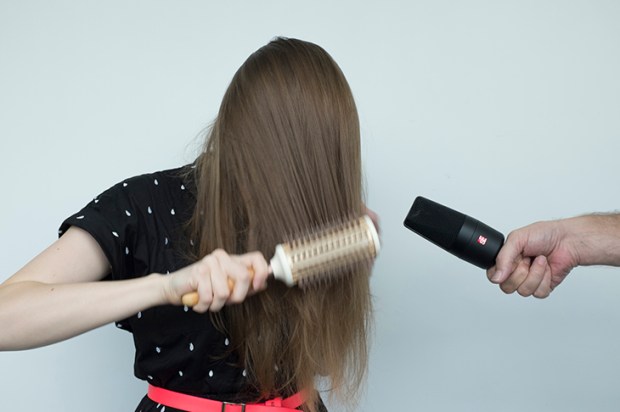On rolls the Harvey Weinstein horror show with no finale in sight. The next episode looks likely to star Uma Thurman, who’s waiting for the right moment, she says, to tell her own Harvey story. Hollywood waits for Uma and I wait for Robert De Niro, who said of Donald Trump: ‘He’s a dog, he’s a pig, a mutt.’ If groping makes you mad, Rob, why so silent about friend Harvey?
Weinstein is clearly a slimeball predator. I hope the great wave of feminist outrage washes all the Harveys clean away, out of Tinseltown, out of Washington, out of Westminster. But running alongside the Weinstein drama is another trickier case — one I think the credibility of the whole #metoo movement rests on.
Four women have now come forward to claim that the nonagenarian George Bush Sr assaulted them. He made a lewd joke, then patted them on the bum, they say. They take this very seriously. Over the past few weeks it has often been pointed out that Bush Sr is 93 and suffers from Parkinson’s and possibly dementia. As far as I can see, this cuts no ice with most of the feminists on social media. There’s no excuse for anyone who perpetuates ‘rape culture’, they say. As Charles Moore wrote last week: ‘The quality of mercy is strained by the age of equality.’
The Bush affair rings an unpleasant little bell with me. Last winter I was helping in a west London day centre, giving out hats and scarves to rough sleepers. One of the centre’s clients was an old man I’ve come across quite often. He’s clearly not all there and he whiles away his days drawing Biro pics of naked cartoon ladies in a notepad he keeps around his neck. He’s harmless and really the ladies are quite good after all his years of practice.
That winter day he was looking for a new audience. He sidled up to my co-worker, a young millennial girl, and showed her his latest. The millennial reacted as if she’d been Tasered. She marched to the front desk: ‘I’d like to report a sexual assault,’ she said. I followed her, trying to explain: ‘He’s harmless, just senile.’ She looked at me sharply: ‘Senility is no excuse for assault,’ she said.
But it is. It’s an excuse in law and should be an excuse in the minds of every rational feminist who wants an end to the era of Harveys. People not in their right minds, men and women with dementia, mental illness, learning difficulties, Down’s syndrome, even sometimes plain old age, are the weakest of us. And if you’ve no mercy for the weakest you do not any more occupy the moral high ground. Your battle is no longer ethical, merely political.
What’s behind this iciness at the heart of this moral movement? There’s the usual screwy relativism — if someone feels assaulted they have been assaulted. End of story. I think there’s also an actual medical mistake. The righteous mission of most 21st-century types is to free the West from discrimination, from racism, misogyny, homo- and trans-phobia. They imagine that come the happy day when all the prejudiced fogeys are dead, there will be no disobliging old bigots or lechers. Their generation will age free from prejudice, and their care homes will shine with mutual respect. They don’t feel for George Bush Sr because they don’t think: there but for the grace of God, one day, go I.
They’re wrong. Old age undoes our minds. It loosens the restraints and lets out the dark and slithering things inside. A decade ago I wrote about the work of a psychologist called Bill von Hippel at the University of Queensland, who showed that, as we age, so the little piece of our brain that stops us voicing our instinctive, often prejudicial, thoughts crumbles away. The old think they’ve earned the right to be outspoken. In fact they often just can’t help it. Recently, von Hippel wrote a piece for the BBC explaining: ‘Psychologists used to believe that greater prejudice among older adults was due to the fact that older people grew up in less egalitarian times. In contrast to this view, we have gathered evidence that normal changes to the brain in late adulthood can lead to greater prejudice among older adults.
‘The frontal lobes are the last part of the brain to develop as we progress through childhood and adolescence, and the first part of the brain to atrophy as we age. Atrophy of the frontal lobes does not diminish intelligence, but it degrades brain areas responsible for inhibiting irrelevant or inappropriate thoughts.’ Can you really, millennials, hand on hearts, say that all your thoughts are fit for broadcast?
Nearly 40 per cent of all 90-year-olds, like Bush Sr, will suffer from serious dementia, and that percentage is rising year on year. If we make it that far we may well do far worse than poor old George. Just ask any care-home worker. The longer we last the more likely we are to strip, flash, grope and grab. We’ll throw toddler tantrums, not because of the culture we’ve been brought up in, but because of the species we belong to.
Perhaps one of the reasons for the unbending attitude towards poor Bush Sr is that so many of the feminists (of both sexes) battling sexism are young. They forget ‘ageism’ in the great roll-call of bigotry because they don’t yet realise they’ll be old. They will. And then mercy might make sense.
Got something to add? Join the discussion and comment below.
Get 10 issues for just $10
Subscribe to The Spectator Australia today for the next 10 magazine issues, plus full online access, for just $10.
You might disagree with half of it, but you’ll enjoy reading all of it. Try your first month for free, then just $2 a week for the remainder of your first year.















Comments
Don't miss out
Join the conversation with other Spectator Australia readers. Subscribe to leave a comment.
SUBSCRIBEAlready a subscriber? Log in